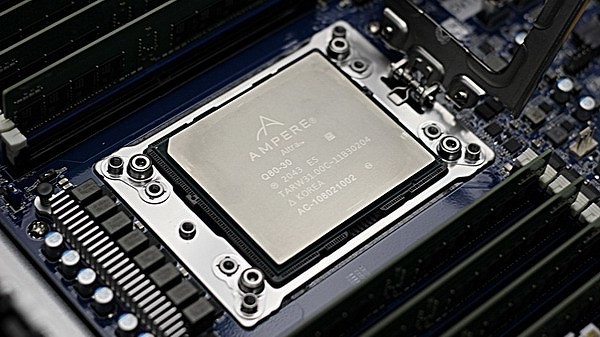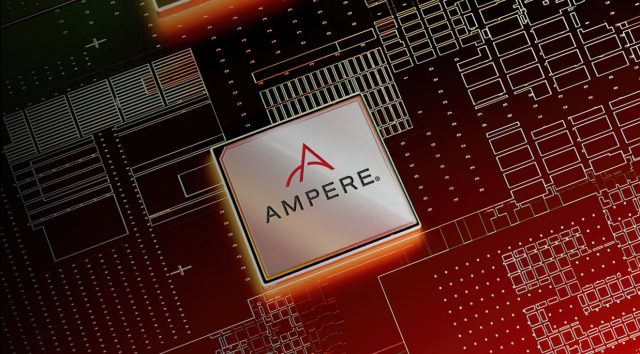Former Intel President Ampere develops 5nm processors and starts shipping 128-core chips this fall

About a year ago, we wrote that Ampere Computing, founded by former Intel President Renee James, announced a 128-core ARM Altra Max processor. These are ARM chips that are based on the ARM Neoverse N1 architecture, which is at the heart of AWS’s AWS Graviton2 processors. Ampere said the new processors will improve hardware performance that cloud service providers are looking for.
Now James said that the shipment of these processors will begin at the end of 2021, and a little later the company will switch to a 5-nm process technology and its own architecture instead of ARM.
What is this company?
It is becoming an increasingly visible player in the chip market, although it was founded only about 4 years ago. It was founded by ex-president of Intel, Renee James, who left her seat in mid-2015.
Then Intel began to reformat its activities, carry out personnel changes, after which some high-ranking employees quit. It is worth noting that James has worked at Intel for over 20 years, she joined the company in 1988, becoming its president in 2013.
The enterprise became successful. A year after its founding, the new company announced a partnership with Lenovo. In addition, Ampere Computing has become a platinum member of the Green Computing Consortium (GCC). In 2019, a fruitful cooperation with Nvidia began, after which other major players drew attention to the company.
80 to 128 cores
In March 2020, Ampere Computing unveiled the world’s first 80-core ARM processor called the Ampere Altra. It was based on the 64-bit Ampere Altra architecture. In tests, the processor showed better performance than the 64-core AMD EPYC or the top-end 28-core Xeon of the Cascade Lake family.
Thanks to the ARM architecture, the processor is very energy efficient, it consumes less power than the x86 counterparts. At the time of release, the TDP of the processor was 45-210 W at a clock frequency of 3 GHz.

All processors of the company, including the 80-core, are designed for use in high-performance server hardware. They are great for server-side applications like data analytics, artificial intelligence, databases, telecommunications stacks, edge computing, and more. Another advantage of the processor is support for data formats FP16 (half-precision numbers) and INT8 (single-byte integer representation).
The 80-core processor was manufactured using a 70-nm process technology at the TSMC factory. Well, immediately after its appearance, the processor was compatible with most existing operating systems and other software products – simply because the vast majority of systems support the ARM architecture.

As for the 128-core chip, it was announced in the middle of last year. The novelty is equipped with 128 physical cores (without multithreading technology). L1 cache for instructions and data – 64 KB, L2 – 1 MB, L3 – 32 MB for each of the cores. Clock frequency cores – 3.0 GHz.

Supports eight-channel ECC DDR4-3200 RAM, maximum 4TB RAM. It also supports a 128-lane PCI Express 4 interface. If you install two processors on one motherboard, the number of supported lanes will be 192. It is known that 32 lanes in this case are used for data exchange between sockets. The entire Altra range is manufactured using TSMC’s 7nm process technology.
The chips support DDR4 up to 3200 MHz (eight channels at once). They are fully compatible with conventional Altras at the socket level, allowing the company’s customers to upgrade to the next generation of processors. The chips have 128 PCI-E 4.0 lanes.
The new processors will be supplied to a number of large companies, including Gigabyte, Wiwynn, Cloudflare, Genymobile, NVIDIA, Equinix. The shipment of the first batch is planned for the end of 2021.
New processors are already in development
Together with the announcement of the imminent release of 128nm processors, Ampere made and another statement – it is moving to its own ARM-compatible architecture and 5nm process technology. A proprietary architecture is needed so that the chips can be customized for different customers – after all, different companies have different needs.
Unfortunately, the company does not disclose the characteristics of the new processors. It is only known that their production will start in 2022. The order for manufacturing will be received by the Taiwanese company TSMC.
Renee James said that the company’s new processors, like previous generations of chips, are intended for servers. They are planned to be delivered to operators of data centers, large and not so IT companies. Among them are Microsoft and Tencent. Probably, the existing customers of the company will not give up on new chips either.

James argues that the new processors will outperform existing Intel and AMD offerings in a number of ways, both in terms of performance and energy efficiency. Among other advantages of its processor, Ampere calls:
• Consistent scaling as cores are added.
• Reduced energy consumption.
• Maximum performance for encryption and multimedia workloads.
The company will soon launch the Ampere Solutions Portal, which will give customers access to daily updates of open source applications that are designed to work with the Altra platform.
Ampere will not be involved in the consumer sector – the company does not want to dissipate efforts and resources. Thus, Ampere Computing will not compete with Intel and AMD, since it competes with them only in the server segment. As far as can be judged, the company was one of the first organizations to successfully start capturing the market, which was previously completely owned by the x86 solution providers.
On the other hand, if the company succeeds with the new processors, it may well try to enter the consumer sector.






